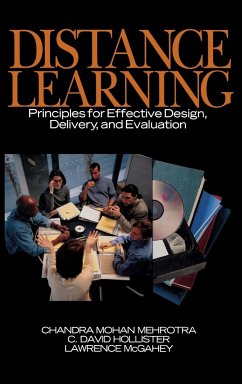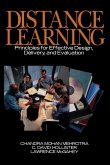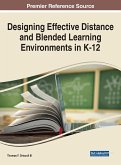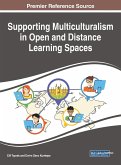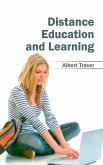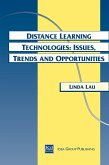Chandra Mehrotra, C. David Hollister, Lawrence McGahey
Distance Learning
Principles for Effective Design, Delivery, and Evaluation
Schade – dieser Artikel ist leider ausverkauft. Sobald wir wissen, ob und wann der Artikel wieder verfügbar ist, informieren wir Sie an dieser Stelle.
Chandra Mehrotra, C. David Hollister, Lawrence McGahey
Distance Learning
Principles for Effective Design, Delivery, and Evaluation
- Gebundenes Buch
- Merkliste
- Auf die Merkliste
- Bewerten Bewerten
- Teilen
- Produkt teilen
- Produkterinnerung
- Produkterinnerung
What delivery methods are available to make education accessible to a wide variety of potential learners? What are their strengths and weaknesses? How can instructors create effective learning environments in distance courses? What support from administrators and staff is essential? What guidelines are used by accrediting agencies to assure program quality? This highly readable book by three experienced faculty members answers these questions and more. Both theoretical and practical, the book presents proven principles and research-based advice. Drawing upon their experience with a variety of…mehr
Andere Kunden interessierten sich auch für
![Distance Learning Distance Learning]() Chandra MehrotraDistance Learning137,99 €
Chandra MehrotraDistance Learning137,99 €![Designing Effective Distance and Blended Learning Environments in K-12 Designing Effective Distance and Blended Learning Environments in K-12]() Designing Effective Distance and Blended Learning Environments in K-12233,99 €
Designing Effective Distance and Blended Learning Environments in K-12233,99 €![Supporting Multiculturalism in Open and Distance Learning Spaces Supporting Multiculturalism in Open and Distance Learning Spaces]() Supporting Multiculturalism in Open and Distance Learning Spaces213,99 €
Supporting Multiculturalism in Open and Distance Learning Spaces213,99 €![Distance Learning Distance Learning]() Marcia L. WilliamsDistance Learning141,99 €
Marcia L. WilliamsDistance Learning141,99 €![Distance Education and Learning Distance Education and Learning]() Distance Education and Learning165,99 €
Distance Education and Learning165,99 €![Future Directions in Distance Learning and Communication Technologies Future Directions in Distance Learning and Communication Technologies]() Future Directions in Distance Learning and Communication Technologies100,99 €
Future Directions in Distance Learning and Communication Technologies100,99 €![Distance Learning Technologies Distance Learning Technologies]() Linda K. LauDistance Learning Technologies74,99 €
Linda K. LauDistance Learning Technologies74,99 €-
-
-
What delivery methods are available to make education accessible to a wide variety of potential learners? What are their strengths and weaknesses? How can instructors create effective learning environments in distance courses? What support from administrators and staff is essential? What guidelines are used by accrediting agencies to assure program quality? This highly readable book by three experienced faculty members answers these questions and more. Both theoretical and practical, the book presents proven principles and research-based advice. Drawing upon their experience with a variety of delivery modes, the authors provide readers with tips they can use in designing, implementing, and evaluating distance courses and programs.
Produktdetails
- Produktdetails
- Verlag: Sage Publications, Inc
- Seitenzahl: 258
- Erscheinungstermin: 26. September 2001
- Englisch
- Abmessung: 235mm x 157mm x 19mm
- Gewicht: 529g
- ISBN-13: 9780761920885
- ISBN-10: 0761920889
- Artikelnr.: 21820949
- Herstellerkennzeichnung
- Libri GmbH
- Europaallee 1
- 36244 Bad Hersfeld
- gpsr@libri.de
- Verlag: Sage Publications, Inc
- Seitenzahl: 258
- Erscheinungstermin: 26. September 2001
- Englisch
- Abmessung: 235mm x 157mm x 19mm
- Gewicht: 529g
- ISBN-13: 9780761920885
- ISBN-10: 0761920889
- Artikelnr.: 21820949
- Herstellerkennzeichnung
- Libri GmbH
- Europaallee 1
- 36244 Bad Hersfeld
- gpsr@libri.de
Chandra M. Mehrotra is Professor of Psychology and Dean for Special Projects at The College of St. Scholastica in Duluth, Minnesota. He received his Ph.D. in psychology from Ohio State University. He is a fellow of the American Psychological Association and the Gerontological Society of America (GSA). He received his college¿s Distinguished Teaching Award in 1979, the APA Division 20 Mentor Award in 2003, and the GSA¿s Outstanding Mentorship Award in 2011. He directs faculty training programs in aging research with support provided by the National Institute on Aging, National Institutes of Health, and the Hartford Foundation. His books include: "Teaching and Aging" (Jossey-Bass, 1984), "Measuring up: Educational Assessment Challenges and Practices for Psychology"? (APA Books, 2004), "Aging and Diversity: An Active Learning Experience (2nd Ed)" (Routledge, 2009), and "Assessing, Teaching and Learning in Psychology: Current and Future Perspectives"? (Cengage, 2013). He has guest-edited two special issues of the journal "Educational Gerontology": (a) "Strengthening Gerontology and Geriatrics Education"; and (b) "Fostering Aging Research in Undergraduate Psychology Programs." His activities with Native American communities include civic engagement among elders, culturally appropriate program evaluation, intergenerational relationships, and improvement of teaching and learning in tribal colleges. He currently serves as a member of American Psychological Association¿s Committee on International Relations in Psychology and the Minnesota Board of Examiners for Nursing Home Administrators.
Acknowledgments
Introduction
Background and Audience
Overview of the Contents
Our Companion Web Site
1. Distance Education: What Is It? And Why Is It Expanding So Rapidly?
Impacts of Technology on Distance Education
The Prevalence of Distance Education in the United States
Societal Changes Contributing to the Growth of Distance Education
The Impact of Distance Education on Traditional Instruction
Criticisms of Distance Education
Conclusion
2. Attracting Students to Distance Learning
How to Assess the Need and Demand for a Distance Program
Target Audience
Instructional Design and Mode of Delivery
Strategies for Marketing Distance Courses and Programs
Specific Ideas for Promoting and Marketing Distance Programs
Conclusion
3. Good Practices in Distance Education: How to Promote Student Learning
and Development
The Good Practices
Summary Tips
4. The Syllabus for Distance Learning Courses
What Is a Syllabus?
More Than a List
Outline for a Syllabus: Putting It Together
Other Issues
Summary Tips
5. Delivery Methods for Distance Education
Synchronous or Asynchronous?
Synchronous Delivery Methods
Asynchronous Delivery Methods
Conclusion
6. Selecting Delivery Methods
Fundamental Principles to Observe in Selecting Delivery Methods
A Decision Tree Approach to Selecting a Delivery Method
Conclusion
7. Support Services
Support Services Prior to Enrollment
Support Services for Enrolled Students
Support Services After Course or Program Completion
Summary
8. Ensuring High Completion Rates
The Problem of Retention
Retention in Distance Education Programs
Strategies for Improving Completion Rates
Summary Tips
9. Assessing Learning Outcomes
Guiding Principles
Methods of Assessment
Conclusion
Summary Tips
10. Program Evaluation
Evaluating Program Inputs
Program Processes
Assessing Outcomes
Analysis of Costs and Outcomes
Conclusion
Summary Tips
11. Accrditation
Guidelines for Distance Learning
Providing Evidence Regarding the Program¿s Effectiveness in Meeting the
Guidelines
Conclusion
Summary Tips
Conclusion
Author Index
Subjedt Index
About the Authors
Introduction
Background and Audience
Overview of the Contents
Our Companion Web Site
1. Distance Education: What Is It? And Why Is It Expanding So Rapidly?
Impacts of Technology on Distance Education
The Prevalence of Distance Education in the United States
Societal Changes Contributing to the Growth of Distance Education
The Impact of Distance Education on Traditional Instruction
Criticisms of Distance Education
Conclusion
2. Attracting Students to Distance Learning
How to Assess the Need and Demand for a Distance Program
Target Audience
Instructional Design and Mode of Delivery
Strategies for Marketing Distance Courses and Programs
Specific Ideas for Promoting and Marketing Distance Programs
Conclusion
3. Good Practices in Distance Education: How to Promote Student Learning
and Development
The Good Practices
Summary Tips
4. The Syllabus for Distance Learning Courses
What Is a Syllabus?
More Than a List
Outline for a Syllabus: Putting It Together
Other Issues
Summary Tips
5. Delivery Methods for Distance Education
Synchronous or Asynchronous?
Synchronous Delivery Methods
Asynchronous Delivery Methods
Conclusion
6. Selecting Delivery Methods
Fundamental Principles to Observe in Selecting Delivery Methods
A Decision Tree Approach to Selecting a Delivery Method
Conclusion
7. Support Services
Support Services Prior to Enrollment
Support Services for Enrolled Students
Support Services After Course or Program Completion
Summary
8. Ensuring High Completion Rates
The Problem of Retention
Retention in Distance Education Programs
Strategies for Improving Completion Rates
Summary Tips
9. Assessing Learning Outcomes
Guiding Principles
Methods of Assessment
Conclusion
Summary Tips
10. Program Evaluation
Evaluating Program Inputs
Program Processes
Assessing Outcomes
Analysis of Costs and Outcomes
Conclusion
Summary Tips
11. Accrditation
Guidelines for Distance Learning
Providing Evidence Regarding the Program¿s Effectiveness in Meeting the
Guidelines
Conclusion
Summary Tips
Conclusion
Author Index
Subjedt Index
About the Authors
Acknowledgments
Introduction
Background and Audience
Overview of the Contents
Our Companion Web Site
1. Distance Education: What Is It? And Why Is It Expanding So Rapidly?
Impacts of Technology on Distance Education
The Prevalence of Distance Education in the United States
Societal Changes Contributing to the Growth of Distance Education
The Impact of Distance Education on Traditional Instruction
Criticisms of Distance Education
Conclusion
2. Attracting Students to Distance Learning
How to Assess the Need and Demand for a Distance Program
Target Audience
Instructional Design and Mode of Delivery
Strategies for Marketing Distance Courses and Programs
Specific Ideas for Promoting and Marketing Distance Programs
Conclusion
3. Good Practices in Distance Education: How to Promote Student Learning
and Development
The Good Practices
Summary Tips
4. The Syllabus for Distance Learning Courses
What Is a Syllabus?
More Than a List
Outline for a Syllabus: Putting It Together
Other Issues
Summary Tips
5. Delivery Methods for Distance Education
Synchronous or Asynchronous?
Synchronous Delivery Methods
Asynchronous Delivery Methods
Conclusion
6. Selecting Delivery Methods
Fundamental Principles to Observe in Selecting Delivery Methods
A Decision Tree Approach to Selecting a Delivery Method
Conclusion
7. Support Services
Support Services Prior to Enrollment
Support Services for Enrolled Students
Support Services After Course or Program Completion
Summary
8. Ensuring High Completion Rates
The Problem of Retention
Retention in Distance Education Programs
Strategies for Improving Completion Rates
Summary Tips
9. Assessing Learning Outcomes
Guiding Principles
Methods of Assessment
Conclusion
Summary Tips
10. Program Evaluation
Evaluating Program Inputs
Program Processes
Assessing Outcomes
Analysis of Costs and Outcomes
Conclusion
Summary Tips
11. Accrditation
Guidelines for Distance Learning
Providing Evidence Regarding the Program¿s Effectiveness in Meeting the
Guidelines
Conclusion
Summary Tips
Conclusion
Author Index
Subjedt Index
About the Authors
Introduction
Background and Audience
Overview of the Contents
Our Companion Web Site
1. Distance Education: What Is It? And Why Is It Expanding So Rapidly?
Impacts of Technology on Distance Education
The Prevalence of Distance Education in the United States
Societal Changes Contributing to the Growth of Distance Education
The Impact of Distance Education on Traditional Instruction
Criticisms of Distance Education
Conclusion
2. Attracting Students to Distance Learning
How to Assess the Need and Demand for a Distance Program
Target Audience
Instructional Design and Mode of Delivery
Strategies for Marketing Distance Courses and Programs
Specific Ideas for Promoting and Marketing Distance Programs
Conclusion
3. Good Practices in Distance Education: How to Promote Student Learning
and Development
The Good Practices
Summary Tips
4. The Syllabus for Distance Learning Courses
What Is a Syllabus?
More Than a List
Outline for a Syllabus: Putting It Together
Other Issues
Summary Tips
5. Delivery Methods for Distance Education
Synchronous or Asynchronous?
Synchronous Delivery Methods
Asynchronous Delivery Methods
Conclusion
6. Selecting Delivery Methods
Fundamental Principles to Observe in Selecting Delivery Methods
A Decision Tree Approach to Selecting a Delivery Method
Conclusion
7. Support Services
Support Services Prior to Enrollment
Support Services for Enrolled Students
Support Services After Course or Program Completion
Summary
8. Ensuring High Completion Rates
The Problem of Retention
Retention in Distance Education Programs
Strategies for Improving Completion Rates
Summary Tips
9. Assessing Learning Outcomes
Guiding Principles
Methods of Assessment
Conclusion
Summary Tips
10. Program Evaluation
Evaluating Program Inputs
Program Processes
Assessing Outcomes
Analysis of Costs and Outcomes
Conclusion
Summary Tips
11. Accrditation
Guidelines for Distance Learning
Providing Evidence Regarding the Program¿s Effectiveness in Meeting the
Guidelines
Conclusion
Summary Tips
Conclusion
Author Index
Subjedt Index
About the Authors

